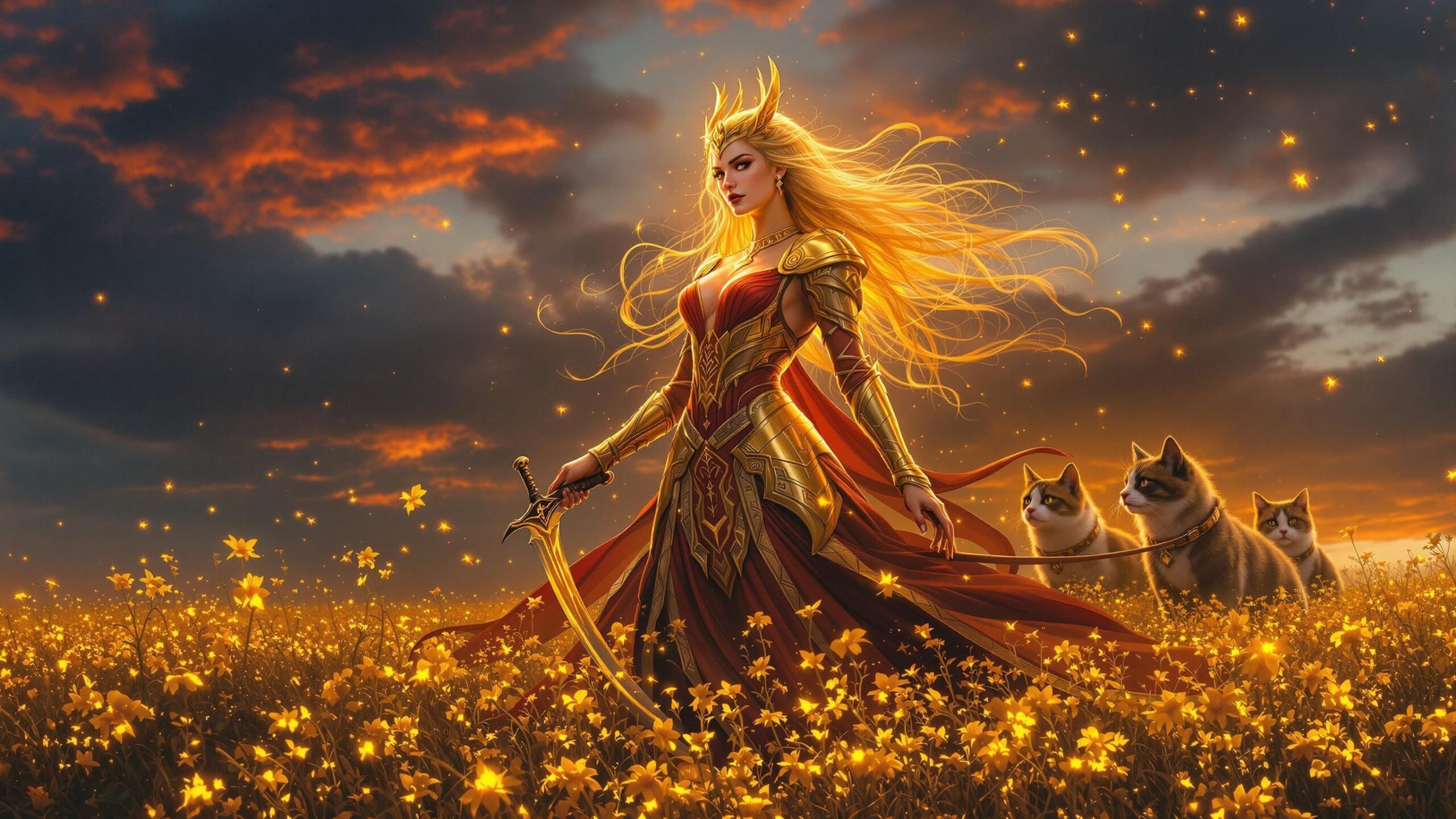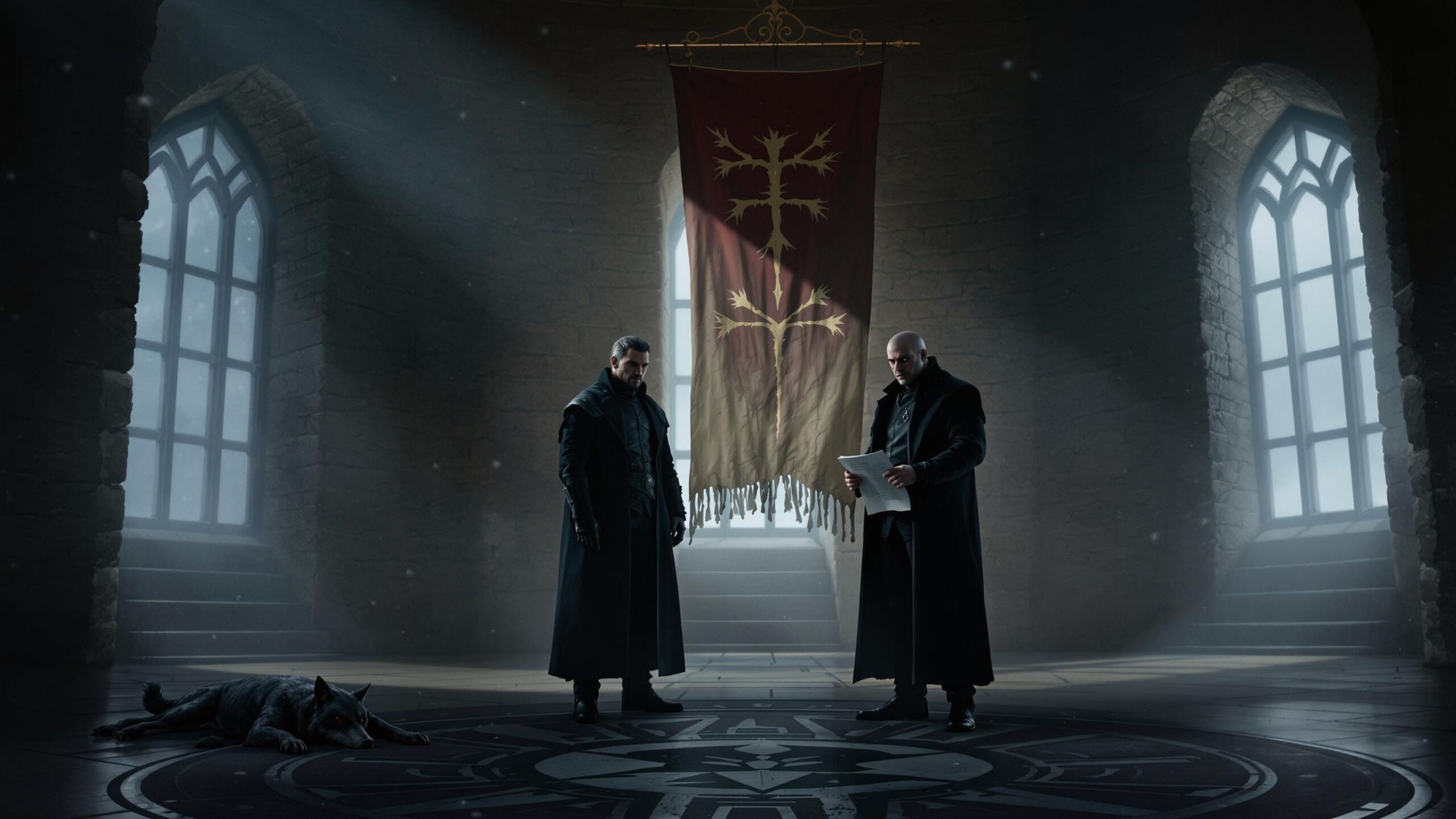Freyja, the radiant goddess of love, beauty, war, and magic, is often remembered for her sensual allure and her deep emotions—but to reduce her to these traits is to overlook one of the most cunning minds in Norse mythology. As a Vanir goddess who adapted seamlessly into the Aesir pantheon, Freyja balanced desire with diplomacy, passion with power. She was no passive beauty. Instead, she was a manipulator of magic, a dealer in secrets, and a tactician whose intelligence often outmatched the brute strength of her peers. Whether guiding fate through her command of seidr (Norse sorcery) or outwitting giants with charm and guile, Freyja proved time and again that cleverness was her deadliest weapon. Here are the top 10 most cunning moments of Freyja that reveal the razor-sharp mind behind her golden beauty.
#10: The Bargain for Brísingamen
Freyja’s legendary necklace, Brísingamen, was not gifted—it was earned. According to myth, four dwarves crafted the treasure deep in the earth, and Freyja, captivated by its beauty, desired it more than anything. Rather than steal or beg, she proposed an unusual bargain: to spend one night with each of the dwarves in exchange for the necklace. The deal was accepted, and Freyja walked away with one of the most powerful and iconic artifacts in Norse lore. On the surface, it may seem scandalous, but Freyja’s maneuver was strategic. She did not rely on theft or deception—she traded what she had, knowing the value of her desirability in a world dominated by gods and warriors. Brísingamen would become a symbol of her status, magic, and femininity weaponized with purpose. It was a transaction rooted not in submission, but in control.
#9: Outwitting Loki in the Return of Brísingamen
When Loki stole Brísingamen and hid it from Freyja, he believed he had scored a victory over the goddess. But Freyja, refusing to be bested, orchestrated its return through a mixture of diplomacy and confrontation. With the help of Heimdall, who transformed into a seal to battle Loki (also disguised), Freyja didn’t need brute strength to reclaim her treasure—she simply manipulated others to act on her behalf. Her cunning was in delegation, in knowing whom to trust, and how to maneuver power without exposing herself to danger. Freyja’s strength often lay in the network she built and her ability to bend male pride to her advantage. The theft of Brísingamen became a lesson in recovery, resilience, and clever command.
#8: Teaching Seidr to Odin
Seidr was the sacred magic of the Vanir—an art of prophecy, fate manipulation, and emotional alchemy. Freyja was the foremost practitioner of this feminine sorcery. After joining the Aesir, she taught Odin the secrets of seidr. But this wasn’t just a gift—it was a strategic play. By sharing the knowledge, Freyja elevated her cultural status within the Aesir and ensured that even Odin, king of the gods, owed her a spiritual debt. She didn’t teach seidr to all the gods—only Odin. This selective transfer of wisdom positioned her as both a magical authority and a cultural linchpin, bridging two divine factions. She maintained control by knowing when to share power, and with whom. In gifting magic, she embedded herself in the very foundation of Asgardian sorcery.
#7: Defying the Giants Through Disguise
When a giant demanded Freyja’s hand in marriage as payment for rebuilding Asgard’s walls, she refused vehemently, understanding the political and cosmic chaos such a union would bring. Rather than submit, the gods concocted a plan: Thor would dress as Freyja and attend the wedding disguised. While Thor gets the spotlight for his embarrassing cross-dressing, Freyja’s cunning is woven into the background. She allowed the deception to proceed, recognizing that manipulating perception was the safest route out of the deal. Her silence was strategic—she avoided conflict by becoming the absent center of a clever ruse. In doing so, she preserved Asgard’s dignity and averted disaster without lifting a weapon.
#6: Her Refusal to Weep for Baldr
After Baldr’s death, the gods sought to bring him back from Hel’s realm. Hel agreed to release him if every creature in the world wept for him. One figure, however, refused—possibly Loki in disguise as a giantess. But another theory posits that it was Freyja herself who withheld tears. If so, this changes everything. It frames Freyja not as the grieving goddess, but as a chessmaster who understood that Baldr’s death was a fixed point in the cosmic cycle. She chose not to disturb fate. If the theory holds weight, Freyja’s refusal becomes one of the coldest, most strategic decisions in mythology: she allowed the death of a beloved god to stand in service of the greater balance of the worlds.
#5: Bargaining Souls in Folkvangr
Most know that Odin claims the souls of warriors for Valhalla—but fewer realize that Freyja has first pick. According to myth, half of the slain go to her hall, Folkvangr. This detail reveals Freyja’s quiet yet profound influence over the afterlife. She doesn’t wage war like Odin or Thor, but she reaps its rewards. And how did she secure this right? Through cunning diplomacy and spiritual positioning. By associating herself with both love and death, Freyja merged the sensual with the martial, redefining who deserved reverence. Her role as chooser of the slain isn’t loud or dramatic—it’s elegant and calculated. In essence, Freyja runs a competing warrior afterlife right under Odin’s nose. She uses wisdom, not warfare, to build her following. It’s a power play that elevates her to near-equal status with the Allfather himself.
#4: Playing Both Sides in the Aesir-Vanir War
When the Aesir and Vanir went to war, Freyja was part of the Vanir delegation sent to Asgard as a peace offering. Yet her role was far from passive. She embedded herself among the Aesir and, through charm, magic, and strategy, influenced their culture from within. She became a bridge, but also a subtle agent of change. Freyja didn’t just adapt—she redefined what it meant to be divine in the Aesir world. Her presence shifted the balance of power, introducing seidr and feminine magical authority into a patriarchal war-driven society. Unlike Odin, who rules through fear and foresight, Freyja ruled through cultural finesse. Her cunning wasn’t in conquering enemies—it was in converting them.
#3: The Secret of Her Falcon Cloak
Freyja’s falcon-feather cloak is one of the most powerful tools in Norse mythology. It allows her to fly between realms, cross impossible distances, and evade even the sharpest eyes. What’s cunning is not just that she owns it—but how she uses it. Freyja doesn’t show off her power. She lends the cloak to gods like Loki when the task suits her. But in doing so, she controls the narrative. No one travels the realms without her knowledge or permission. She turns a garment into leverage. By making herself indispensable to divine missions, Freyja elevates her influence across realms—not with brute strength, but with a single well-guarded magical accessory. Her mobility becomes her dominion.
#2: Surviving Ragnarök
Unlike many gods who meet their doom at Ragnarök, Freyja’s fate is uncertain. Some say she survives. If so, it’s no accident. Her cunning lies in her ability to avoid entanglement in the very prophecies that doom others. While Thor, Odin, Loki, and Heimdall are all locked into fatal confrontations, Freyja seems to maneuver through fate with a kind of spiritual finesse. She is not bound by the same masculine codes of vengeance and prophecy. Freyja’s strength is in preservation. If she does survive Ragnarök, it will be a testament to her strategic neutrality, her skill in weaving around fate rather than charging into it. In a mythos obsessed with destiny, Freyja may be the rare figure who escapes it.
#1: Ruling Through Ambiguity
Freyja’s greatest trick, perhaps, is never letting anyone define her completely. She is the goddess of love—but also war. She weeps tears of gold—but leads the Valkyries. She sleeps with dwarves—but chooses warriors. She gives magic to men—but never surrenders her power. Freyja inhabits contradictions and uses them as shields. She defies categorization, and in doing so, becomes untouchable. While other gods fall victim to their roles—Odin the tyrant, Thor the brawler, Loki the outcast—Freyja thrives in mystery. Her cunning is existential. By refusing to be pinned down, Freyja masters her myth. She becomes the goddess of complexity itself, and in a world ruled by fixed destinies, ambiguity is the ultimate weapon.
Freyja is more than a goddess of beauty or a sorrowful figure weeping golden tears. She is a mastermind, a quiet storm, a weaver of fates and magic who never needs to shout to be heard. Her cunning lies in her adaptability, her subtlety, and her power to shape the mythological landscape through desire, diplomacy, and sorcery. Whether commanding the battlefield with her Valkyries or negotiating with giants through grace and wit, Freyja’s influence was never about domination—it was about evolution. She changed Norse mythology not with loud thunderclaps, but with whispered spells and elegant strategy. The goddess of love and war, indeed—but more importantly, the goddess of survival through cunning.




